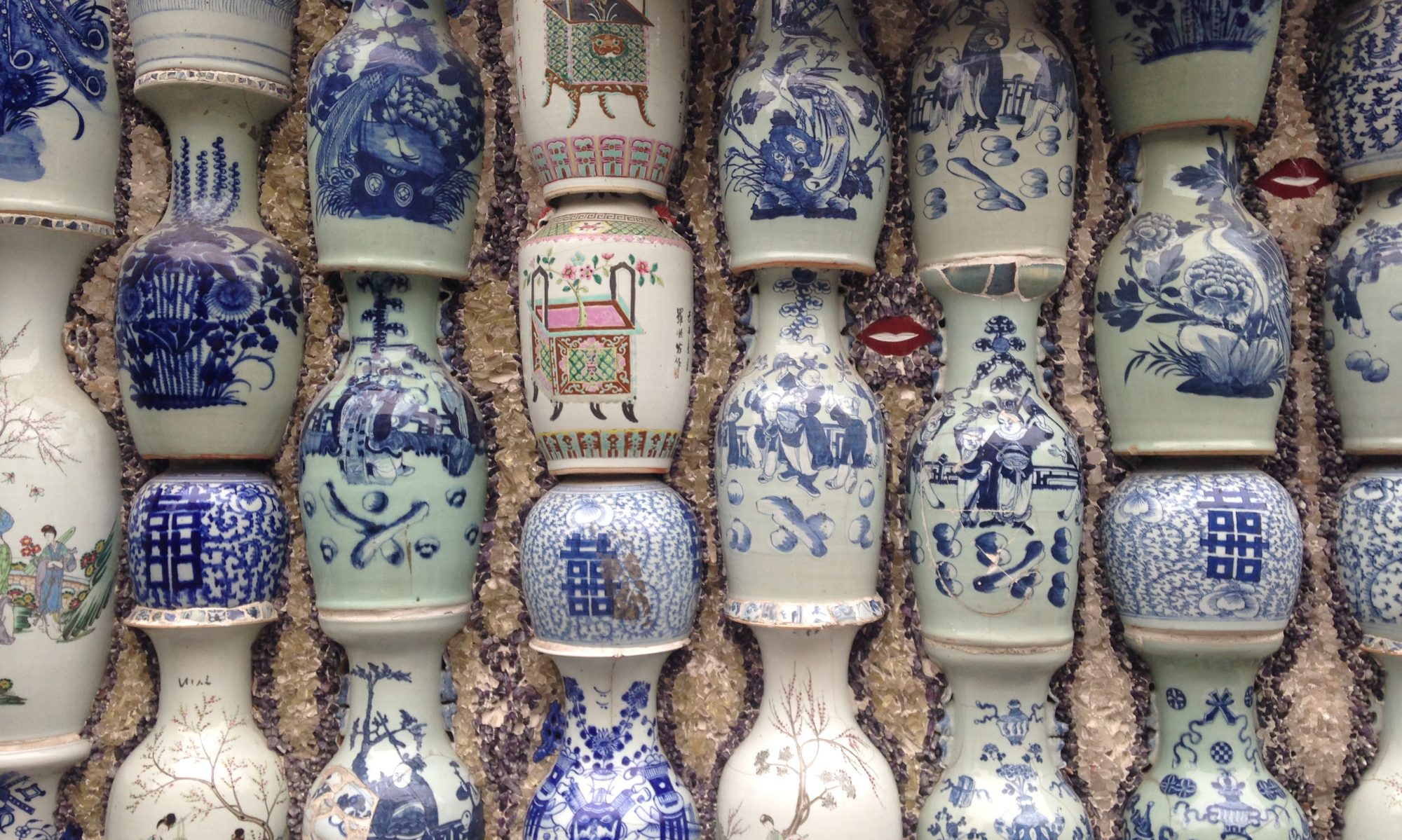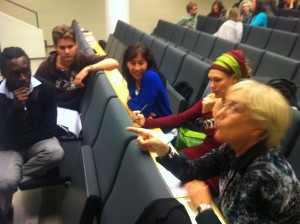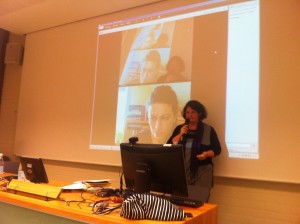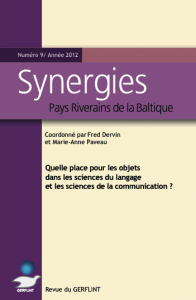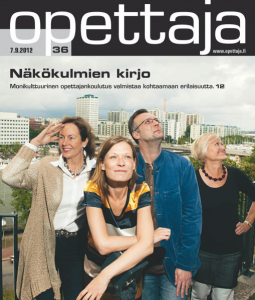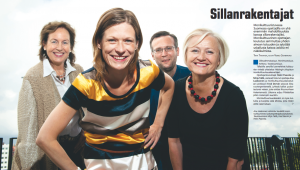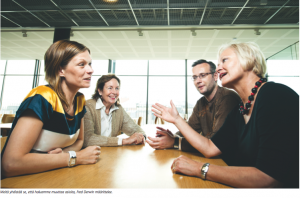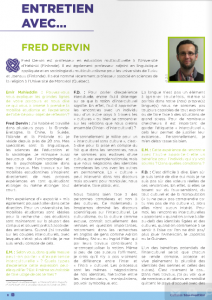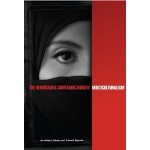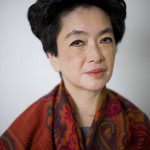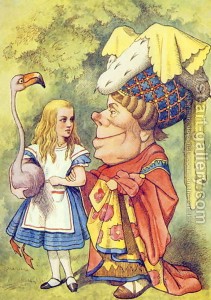Very successful conference 5.10, Making sense of education of diversities
E4D organized a one-day conference on 5.10.2012 to discuss the idea of Education for Diversities. Four speakers from different contexts, who shared a similar approach to diversities, shared their views on how to conceptualize and research them in education.
The speakers were: Martine Abdallah-Pretceille (Universities of Paris), Vanessa Andreotti (University of Oulu), Maria Kromidas (USA) and Tania Ogay (University of Fribourg, Switzerland). My colleagues and friends, Anahy Gajardo and Anne Lavanchy, with whom I have published two volumes on interculturality, were also took part in the event.
Amin, Jaakko, Anahy, Anne and Martine Abdallah-Pretceille
Digital interaction between Tania Ogay and Maria Kromidas
Excellent website on international students in Finland
Dr Byrd Clark named docent in multicultural education at Helsinki
Dr. Julie Byrd Clark has been named docent (in Multicultural Education) at the Department of Teacher Education, University of Helsinki (Finland). Julie is the first Docent to be ‘attached’ to E4D! Welcome onboard! MORE INFO HERE
A few words about Julie: Julie Byrd Clark is an Assistant Professor in the Faculty of Education at Western University (London, Ontario, Canada). She is the author of Multilingualism, Citizenship, and Identity: Voices of Youth and Symbolic Investments in an Urban, Globalized World (2009), with Continuum, and has numerous publications in both English and French.
Julie Byrd Clark and Fred Dervin (June 2012)
New journal issue: objects in linguistics and communication studies
Opettajan lehti (7.9) – Monikulttuurinen opettajankoulutus valmistaa kohtaamaan erilaisuutta
Interview in French (Revue Interculturelle Cultures sans Frontières)
New book: The Democratic Contradictions of Multiculturalism
The Democratic Contradictions of Multiculturalism
Jens-Martin Eriksen & Frederik Stjernfelt
What is multiculturalism? Is it every person s right in a democratic society to choose his or her religion and culture and to express criticism regardless of taboos and moralistic norms? Or is it, on the contrary, the right of cultures and religions to be protected from insult and to preserve themselves against change? In The Democratic Contradictions of Multiculturalism, Frederik Stjernfelt and Jens-Martin Eriksen examine these questions in relation to both the ideology and the reality of multiculturalism. The discussion covers a range of issues, including the Muhammad cartoons, laws against blasphemy, hijab, the Islamic ban on apostasy, and the limits of the freedom of religion.
Stjernfelt and Eriksen focus their investigation on a multicultural country and examine the implications of this controversial concept as it is applied to political reality. What do people regard as the advantages and disadvantages of multiculturalism? How does the legal system influence the life of the individual? In what way does multiculturalism lead to a new segregation of society with respect to gender, culture, and religion? How can one explain the democratic contradictions of multiculturalism when the system clashes with universal values and human rights?
In recent decades, the concept of culture has appeared on the political agenda with growing importance, to a point that “culture” has become a political ideology. How did that happen? Where does this specific concept of culture come from? What are its historical roots in anthropology, philosophy, and politics? In what way does “the cultural argument” influence our way of thinking when we adopt it, more or less unconsciously, in everyday debate?
The controversy over multiculturalism has changed the political front lines as well. Liberals and the left seem to defend the rights and respect of minority cultures, while conservatives and the nationalist right seem to stand guard for the majority national culture. But the question is: are these front lines for real? At the end of the day, do the conventional left and right really think in fundamentally different ways? Or do they simply represent variations on a bigoted understanding of what culture means?
The Democratic Contradictions of Multiculturalism is an erudite manifesto for freedom and a confrontation with any kind of attempt–be it left or right–to fence people within their cultures.
China
Détacher la pensée chinoise de son histoire, faire l’économie d’une analyse empirique de ses usages successifs, contradictoires, et de ses réinventions, c’est ce qui mène à l’essentialisme, à l’opposition bloc contre bloc, au « choc des civilisations » à la Huntington. C’est, selon moi, non seulement une erreur, mais un danger dans le contexte actuel : figer « la » pensée chinoise, oublier l’histoire — inachevée — qui l’a constituée, c’est risquer la récupération idéologique, à un moment où le pouvoir en Chine se cherche une légitimité culturelle. Pire, s’attacher à souligner l’altérité chinoise, c’est risquer de conforter un certain discours officiel qui a beau jeu de s’emparer de cette altérité pour prétendre que la Chine n’a que faire de la démocratie, de droits de l’homme, etc. qui seraient étrangers à sa culture.
Be what you would seem to be
Be what you would seem to be – or, if you’d like it put more simply – Never imagine yourself not to be otherwise than what it might appear to others that what you were or might have been was not otherwise than what you had been would have appeared to them to be otherwise.
The Duchess in Alice in Wunderland
